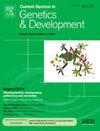Decoding cancer etiology with cellular reprogramming
IF 3.6
2区 生物学
Q2 CELL BIOLOGY
引用次数: 0
Abstract
Cancer research remains clinically unmet in many areas due to limited access to patient samples and the lack of reliable model systems that truly reflect human cancer biology. The emergence of patient-derived induced pluripotent stem cells and engineered human pluripotent stem cells (hPSCs) has helped overcome these challenges, offering a versatile alternative platform for advancing cancer research. These hPSCs are already proving to be valuable models for studying specific cancer driver mutations, offering insights into cancer origins, pathogenesis, tumor heterogeneity, clonal evolution, and facilitating drug discovery and testing. This article reviews recent progress in utilizing hPSCs for clinically relevant cancer models and highlights efforts to deepen our understanding of fundamental cancer biology.
用细胞重编程解码癌症病因学。
由于获得患者样本的机会有限,以及缺乏真正反映人类癌症生物学的可靠模型系统,癌症研究在许多领域仍未得到临床满足。患者来源的诱导多能干细胞和工程化人类多能干细胞(hPSCs)的出现帮助克服了这些挑战,为推进癌症研究提供了一个多功能的替代平台。这些hPSCs已经被证明是研究特定癌症驱动突变的有价值的模型,为癌症的起源、发病机制、肿瘤异质性、克隆进化提供了见解,并促进了药物的发现和测试。本文综述了利用hPSCs建立临床相关癌症模型的最新进展,并强调了加深我们对基础癌症生物学的理解的努力。
本文章由计算机程序翻译,如有差异,请以英文原文为准。
求助全文
约1分钟内获得全文
求助全文
来源期刊
CiteScore
7.90
自引率
0.00%
发文量
102
审稿时长
1 months
期刊介绍:
Current Opinion in Genetics and Development aims to stimulate scientifically grounded, interdisciplinary, multi-scale debate and exchange of ideas. It contains polished, concise and timely reviews and opinions, with particular emphasis on those articles published in the past two years. In addition to describing recent trends, the authors are encouraged to give their subjective opinion of the topics discussed.
In Current Opinion in Genetics and Development we help the reader by providing in a systematic manner:
1. The views of experts on current advances in their field in a clear and readable form.
2. Evaluations of the most interesting papers, annotated by experts, from the great wealth of original publications.[...]
The subject of Genetics and Development is divided into six themed sections, each of which is reviewed once a year:
• Cancer Genomics
• Genome Architecture and Expression
• Molecular and genetic basis of disease
• Developmental mechanisms, patterning and evolution
• Cell reprogramming, regeneration and repair
• Genetics of Human Origin / Evolutionary genetics (alternate years)

 求助内容:
求助内容: 应助结果提醒方式:
应助结果提醒方式:


